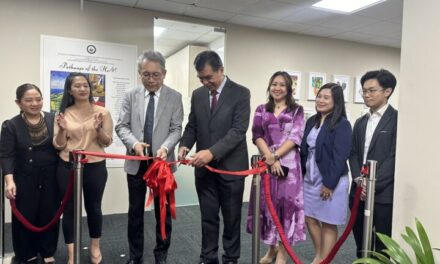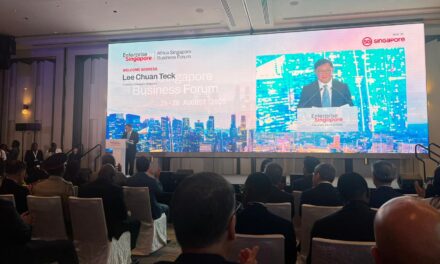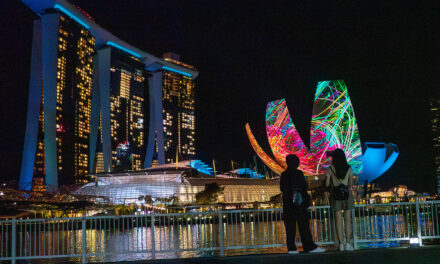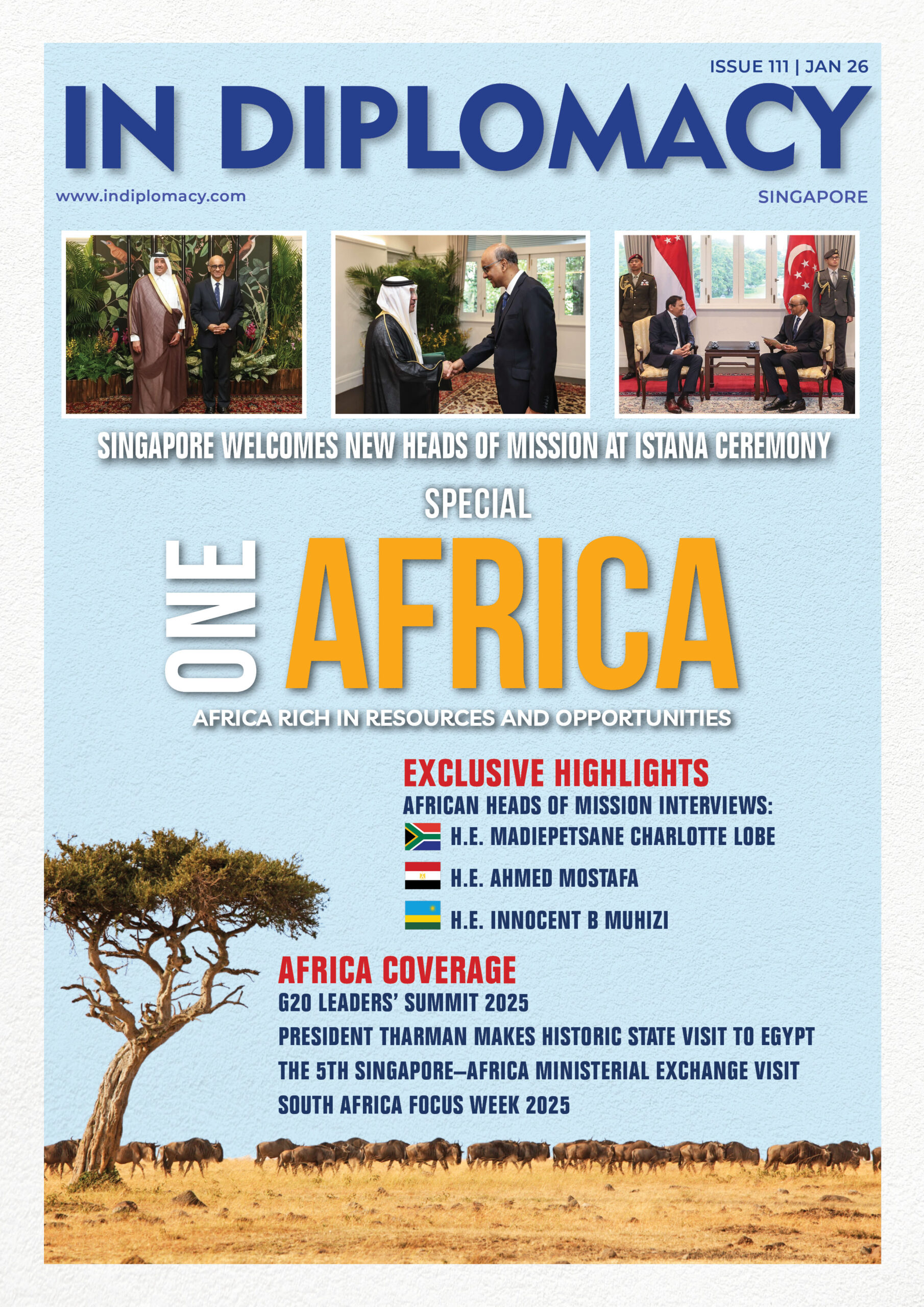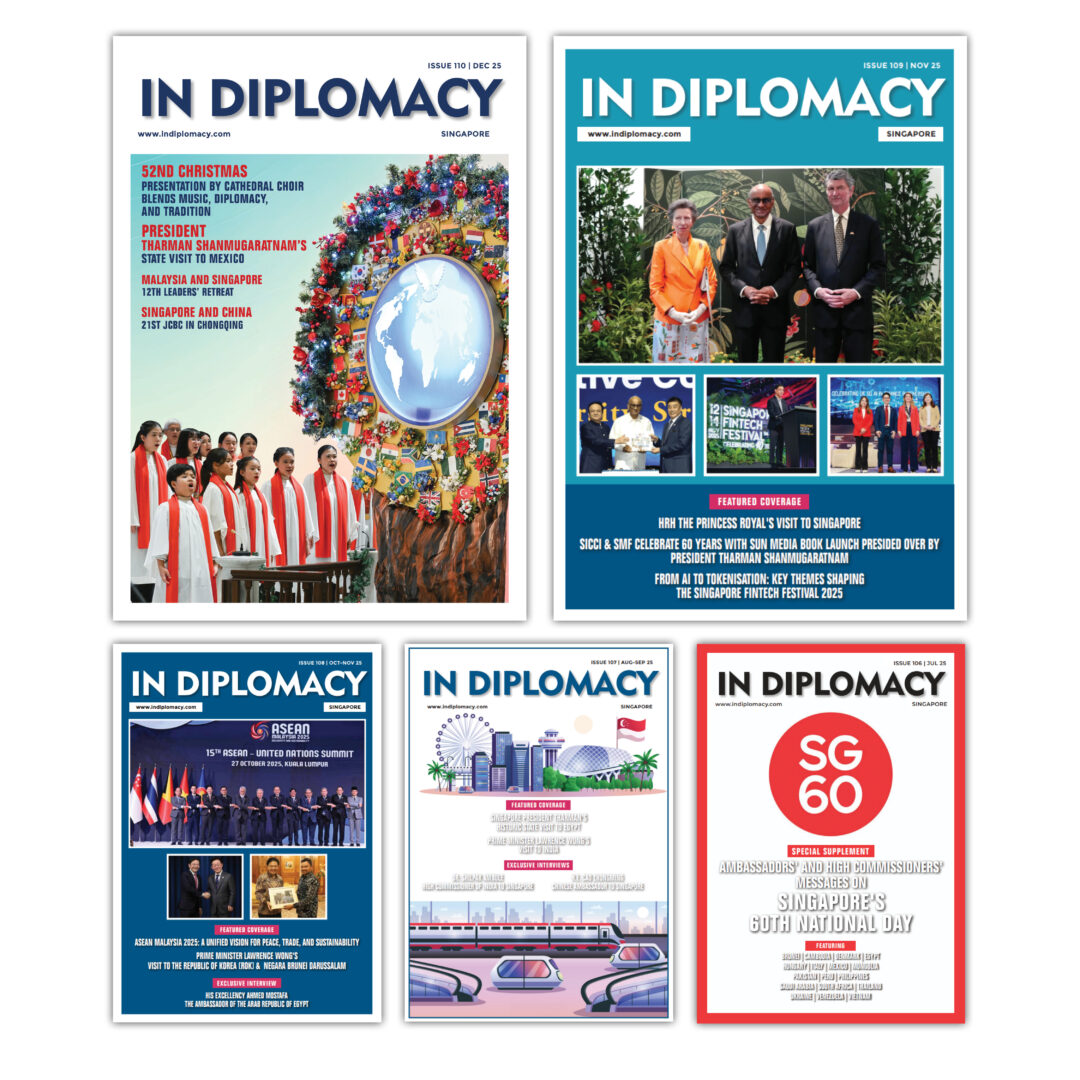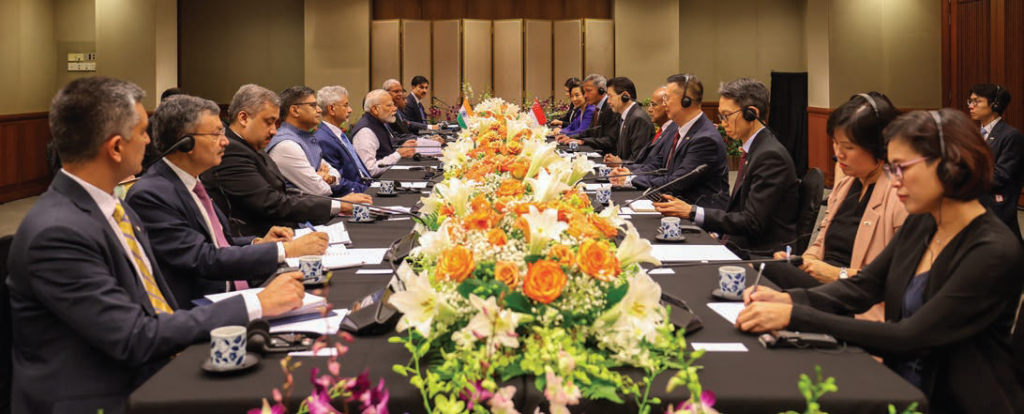
The Prime Minister of the Republic of Singapore, Lawrence Wong, congratulated Prime Minister Narendra Modi on his historic third
term and expressed confidence in India’s continued development and its growing international role under his leadership. In return, Prime Minister Modi congratulated Prime Minister Wong on assuming office and expressed optimism that, under his stewardship, Singapore would continue to thrive as a model of economic development.
The Prime Ministers acknowledged the shared history and strong friendship between India and Singapore, built on trust, mutual respect, and extensive cooperation across political, economic, security, technological, educational, and cultural spheres. They reviewed the progress of the bilateral relationship, which has evolved into comprehensive cooperation, and agreed to elevate this to a ‘Comprehensive Strategic Partnership’ to deepen ties further. With the 60th anniversary of diplomatic relations approaching next year, they expressed their commitment to marking this milestone by enhancing bilateral engagement.
Both leaders welcomed the recent second meeting of the India-Singapore Ministerial Roundtable (ISMR) in Singapore, which set a forward-looking agenda for cooperation under six key pillars. They also emphasised the potential for increased collaboration in Green Hydrogen and Green Ammonia and welcomed the partnerships already underway between Indian and Singaporean companies in these areas. To further strengthen collaboration, they directed their teams to develop a cooperation framework under Article 6.2 of the Paris Agreement.
Prime Minister Wong expressed appreciation for India’s decision to exempt Singapore from the export ban on non-Basmati white rice, to which Prime Minister Modi affirmed India’s commitment to supporting Singapore’s food security efforts. They also highlighted the importance of Singapore’s participation in the International Solar Alliance and Global Biofuels Alliance, agreeing that both countries could collaborate further to promote sustainable development.
They welcomed the signing of an MoU on Digital Technologies, affirming their shared interest in data, AI, and cybersecurity. Building on this, both leaders agreed to expand digital collaboration, including cross-border data flows, cybersecurity, and digital system interoperability. Discussions have commenced toward a bilateral Cyber Policy Dialogue, with plans to renew the MoU on Cybersecurity Cooperation between their respective Cyber Emergency Response Teams.
They commended the success of the UPI-PayNow linkage and other digital initiatives, including ONDC-Proxtera connectivity and TradeTrust, which enables interoperable electronic Bills of Lading (eBLs) in Letter of Credit transactions. The recent TradeTrust live transaction between Singapore and India, a global first for a paperless shipping process, marked a milestone in reducing costs and enhancing trade financing. Both countries will expand TradeTrust’s adoption to more companies for similar transactions and explore collaboration in critical and emerging technologies.

Business Roundtable Highlights
In a pivotal gathering that further cemented the relationship between Singapore and India, Prime Minister Narendra Modi participated in a business roundtable hosted in Singapore. The event, attended by top government officials and key industry leaders, highlighted ongoing efforts to deepen bilateral economic ties and foster collaboration in emerging sectors. This roundtable marks PM Modi’s third official visit to Singapore, underscoring the strategic importance both countries place on their partnership.
During the event, Deputy Prime Minister and Minister for Trade and Industry, Gan Kim Yong, warmly welcomed PM Modi and his delegation, noting the rapid economic transformation India has experienced since Modi’s first visit in 2015, especially in renewable energy, electronics, and electric vehicles. Singapore, as a long-term partner, has supported India’s growth and was India’s largest investor in the financial year 2022, contributing around 23% of India’s Foreign Direct Investment (FDI) inflows since 2000. This close economic partnership is sustained by robust business relationships, and the roundtable offered a platform to discuss expanding these partnerships into new growth sectors.
Deputy Prime Minister Gan emphasised the potential for businesses in both countries to explore emerging industries while building on traditional connections. Leaders from diverse sectors attended the roundtable, reflecting the broad scope of collaboration opportunities in areas such as industrial parks, skills development, infrastructure, and digitalisation. The gathering also referenced commitments made during the recent India-Singapore Business Roundtable to enhance collaboration in these strategic fields.
Collaboration in Semiconductor
The Prime Ministers agreed that advanced manufacturing, particularly in developing resilient semiconductor supply chains, can be a new pillar of bilateral cooperation.
A significant outcome of PM Modi’s visit was the signing of a Memorandum of Understanding (MoU) on the India-Singapore Semiconductor Ecosystem Partnership. This MoU supports India’s ambition to become a global hub for semiconductor manufacturing by leveraging Singapore’s established semiconductor ecosystem. Exchanged in the presence of PM Modi and Singapore’s Prime Minister Lawrence Wong, the MoU was signed by Gan Kim Yong and India’s Minister of Electronics and Information Technology, Ashwini Vaishnaw, during the India-Singapore Ministerial Roundtable on August 26, 2024.
This collaboration will involve policy exchanges on ecosystem development, supply chain resilience, and workforce training. To facilitate these initiatives, the Ministry of Trade and Industry (MTI) and India’s Ministry of Electronics and Information Technology (MeitY) will establish a Policy Dialogue. Additionally, a business-to-business Cooperation Forum, led by Enterprise Singapore and the India Semiconductor Mission (ISM), will be set up to foster private-sector partnerships, enabling businesses in both countries to collaborate and capitalise on opportunities in the semiconductor industry. Gan expressed optimism about the MoU, highlighting Singapore’s pivotal role in the global semiconductor supply chain.


MoU Signing on Educational Cooperation and Skills Development
During the visit, an MoU on cooperation in the field of Educational Cooperation and Skills Development was signed, and both prime ministers were happy to explore further collaboration in skills certification.
They reaffirmed the progress in skills development cooperation with the establishment of five skill centres in India, where Singaporean institutions provided consultancy services and undertook turnkey projects.
Prime Minister Modi’s interaction with students and young professionals was a noteworthy aspect of the visit. Engaging with students from the India Ready Talent Programme and interns from the Odisha World Skills Center, who are working with Singaporean companies, highlighted the commitment to fostering a strong people-to-people connection. This engagement also reinforced the shared vision of developing a skilled workforce capable of meeting the demands of a rapidly changing global economy.
Collaboration in Healthcare & Medicine
The Prime Ministers welcomed the signing of the MoU on cooperation in the field of Health and Medicine. They agreed to strengthen cooperation in healthcare, medical education, research, and human resource development in both countries.
They acknowledged the potential of human resource development in the health sector. The duo also called for an early conclusion of the proposed MoU on Nursing Talent Skills Corporation between the Government of Assam and Singapore India Partnership Office and MOH Holdings Pte Ltd of the Government of Singapore.
Air and Sea Connectivity between Singapore and India
They noted the potential to enhance cooperation in the maritime and aviation sectors between India and Singapore, including areas such as green shipping and maintenance, repair, and operations (MRO).
They welcomed investment from Singapore in the Indian Civil Aviation Sector and expressed their hope that this will lead to improved connectivity between the two countries. They recognised the growth in travel demand between the two countries and encouraged the civil aviation authorities of both countries to discuss expanding the bilateral Air Services Agreement to enhance air connectivity.
They reaffirmed the importance of trade, investments, defence cooperation, culture, and people-topeople exchanges in overall bilateral cooperation.
Regular Exchanges and Visits
The duo welcomed the regular high-level visits and consultations between India and Singapore. Prime Minister Modi thanked Prime
Minister Wong and Senior Minister Lee for Singapore’s support for India’s G20 Presidency in 2023 and the participation of several Ministers, officials, and other dignitaries from Singapore in G20 meetings in India, including the visit of the then Prime Minister Lee to India for the G20 Leaders’ Summit in Delhi. Prime Minister Wong congratulated Prime Minister Modi for the success of India’s G20 Presidency.
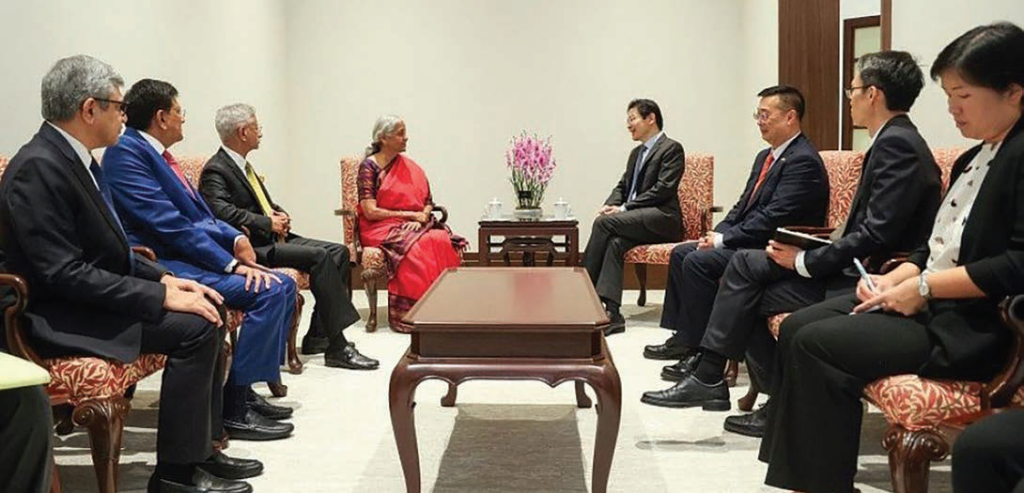
Defence Collaboration
They reaffirmed the importance of the deep and longstanding defence relationship between the two nations which is built on close
historical ties, shared strategic perspectives, and common interests. Noting the high level of exchanges and bilateral exercises by the three services (Army Exercise Agni Warrior, Navy Exercise SIMBEX & SITMEX, and Air Force Exercise JMT), they commended the Armed Forces for maintaining a high level of professional exchanges through regular interactions. Prime Minister Modi appreciated Singapore’s support, as the country coordinator for India-ASEAN dialogue partner relations from 2021-2024, for cohosting the inaugural ASEAN-India Maritime Exercise which allowed India to collaborate with the ASEAN Member States in addressing common maritime security challenges in the region. He also expressed his firm belief in the need to further strengthen such cooperation which enables both sides to address common challenges in contemporary and niche domains and help reap benefits from collective wisdom, in the true spirit of cooperation.
Prime Minister Wong expressed his deep appreciation of India’s consistent support for the Singapore Armed Forces’ training in India which has elevated in both scope and scale in all domains, and welcomed India’s active participation in the regional security architecture, particularly through the ADMM-Plus mechanism.
Business Links Key Drivers
Both Prime Ministers recognized that bilateral business and commercial linkages constitute key drivers of the wide-ranging India- Singapore partnership. Both Prime Ministers reaffirmed the significance of the Comprehensive Economic Cooperation Agreement (CECA) signed in 2005, and reviewed in 2007 and 2018, for the economic partnership between the two countries.
They desired an early conclusion of the Third Review of CECA, which will ensure the agreement remains fit for the future economies of India and Singapore. They also affirmed the importance of the review of the ASEAN-India Trade in Goods Agreement (AITIGA) to make it more user-friendly, simple, and trade facilitative for business, with the aim to achieve a substantial conclusion in 2025.
Both Prime Ministers agreed that India offers immense investment opportunities for Singaporean investors. Both Prime Ministers also acknowledged the collaborations between Singapore Cooperation Enterprise (SCE) and various states in India on smart cities and urban infrastructure including housing. These include workshops in sustainability and urban water management with India’s Ministry of Housing and Urban Affairs.
Both Prime Ministers also welcomed the signing of the MoU between SCE and the state of Assam on urban planning and management for the city of Guwahati. The Prime Ministers also recognized the progress in the Gujarat International Finance Tec-City (GIFT) Connect, which is the first-of-its-kind trading linkage between Singapore’s and India’s capital markets established by the Singapore Exchange and the National Stock Exchange of India.
MoU of Laws and Disputes
The two Prime Ministers noted the signing of the MoU on cooperation in the sphere of law and dispute resolution in March 2024. They agreed to work together to promote the exchange of people, expertise, and information, as well as facilitate, hold, and organize events and courses on international commercial dispute resolution, promotion of alternative dispute resolution mechanisms, and other areas of mutual interests.
Science and Technology
They noted that relevant agencies of the two countries are already working on cooperation in the areas of science and technology. Prime Minister Modi appreciated Singapore’s support for hosting the inaugural ASEAN-India Women Scientists Conclave in Singapore in April 2024. Both Prime Ministers were also appreciative of the ‘India-Singapore e-Workshop: Advancements in Digital Health and Medical Technologies’, held in July 2024, which initiated a dialogue between India and Singapore under the MoU on Science & Technology Cooperation. The Prime Ministers also noted the successful award of the first joint call for the India-Singapore Collaborative Industrial Research and Development Programme in August 2024 and look forward to such continuous collaborations in the coming years.
They agreed to further intensify the strong human, spiritual, and cultural linkages between India and Singapore. Prime Minister Modi expressed deep appreciation for Singapore’s harmonious multicultural society that has supported and provided opportunities for all communities, including the Indian community, to be part of the Singaporean society.
They expressed a convergence of views on various regional and international issues, including the regional security dynamics. Both sides reiterated their desire and determination to work together to maintain peace, stability, growth, and prosperity in the region and beyond.

Regional and International Issues
Underlining the link between prosperity and security, the leaders reaffirmed the importance of maintaining and promoting peace, security, stability, safety, and freedom of navigation in and overflight above the South China Sea, while pursuing the peaceful resolution of disputes in accordance with international law, particularly the 1982 United Nations Convention on the Law of the Sea (UNCLOS), without resorting to the threat or use of force.
Both sides also called on all parties to resolve disputes through peaceful means without threat or use of force and exercise self-restraint in the conduct of actions that could escalate tensions in the region. Both leaders emphasized the legal framework set out by the UNCLOS within which all activities in the oceans and seas must be carried out, and that UNCLOS is the basis for determining maritime entitlements, sovereign rights, jurisdiction, and legitimate interests over maritime zones.
Both leaders expressed hope for the early conclusion of a substantive and effective Code of Conduct in the South China Sea (COC) in accordance with international law, especially UNCLOS, that does not prejudice the legitimate rights and interests of all nations including those not party to these negotiations.
They recognise that terrorism continues to remain the single most significant threat to peace and stability reiterated their strong
commitment to combat terrorism in all its forms and manifestations, and stressed that there can be no justification for acts of terror on any grounds whatsoever. They affirmed their resolve to fight against global terrorism and terror organisations. The Prime Ministers also called for reinvigorating multilateral action on terrorism, including through reiterating the importance of the conclusion of the Comprehensive Convention on International Terrorism in the United Nations at the earliest.
Both Prime Ministers emphasised the importance of upholding international standards on antimoney laundering and combating
the financing of terrorism, consistent with the Financial Action Task Force (FATF) recommendations. Both countries reiterated their commitment to work together in FATF and other multilateral platforms.
They lauded the cooperation between both sides at regional and international fora and reaffirmed efforts to strengthen cooperation, particularly in the United Nations (UN), World Trade Organization (WTO), Indian Ocean Rim Association (IORA), Non-Aligned Movement (NAM), Commonwealth, and related forums as well as other regional cooperation mechanisms.
Prime Minister Wong reaffirmed Singapore’s continuing support for India as a permanent member of a reformed United Nations Security Council. Prime Minister Modi thanked Prime Minister Wong for extending support for India’s candidature as a non-permanent member of the UN Security Council for the 2028-29 term.
The Prime Ministers reaffirmed their commitment to work together to promote peace and stability across the Indo-Pacific region. They underlined the importance of an open, inclusive, rules-based, and resilient Indo-Pacific region, which promotes free trade and open markets and where differences are resolved peacefully in accordance with international law. They acknowledged India and Singapore’s close cooperation on, and support for, the Indo-Pacific Economic Framework for Prosperity (IPEF).
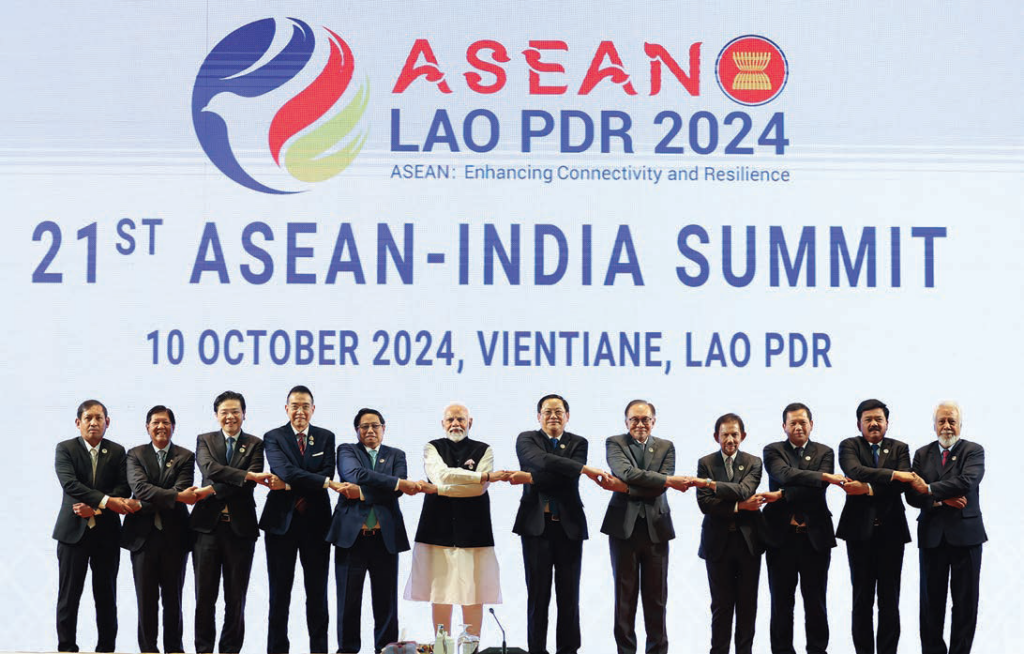
ASEAN-India Comprehensive Strategic Partnership
The duo agreed on the importance of ASEAN Centrality in the evolving regional architecture for regional peace, stability, and prosperity. They supported further strengthening the ASEAN-India Comprehensive Strategic Partnership which complements India’s bilateral relations with individual Member States. They appreciated the ASEAN-India Joint Statement on Cooperation on the ASEAN Outlook on the Indo-Pacific (AOIP) for Peace, Stability, and Prosperity in the Region which provides opportunities for further cooperation between the AOIP and Indo-Pacific Oceans Initiative. Prime Minister Modi appreciated the valuable contribution of Singapore as the ASEAN Country Coordinator for India for the period 2021-24.
Both sides also welcomed the Quad’s support for ASEAN centrality, including the Quad’s agenda to support the priorities and needs of countries in the Indo-Pacific region, and explored synergies for mutually beneficial cooperation.
Prime Minister Modi thanked Prime Minister Wong for the warmth of his hospitality and all the excellent arrangements made for the visit. Prime Minister Modi conveyed that India is looking forward to the visit of President Tharman Shanmugaratnam to India next year. Prime Minister Modi also invited Prime Minister Wong to visit India at a mutually convenient time.

